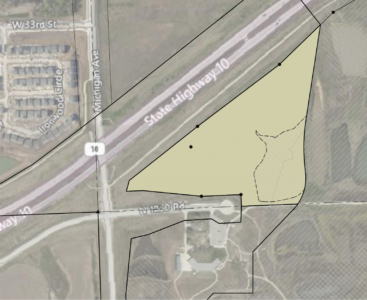‘From surviving to thriving’: Tenants to Homeowners’ Sunrise House places an emphasis on community and supportive services

photo by: Austin Hornbostel/Journal-World
Tenants to Homeowners' Sunrise House at 910 W. 24th St., a supportive service community home, is pictured Friday, Sept. 8, 2023. The agency hosted an open house Friday to celebrate the completion of eight months' worth of renovations at the home.
At Tenants to Homeowners’ Sunrise House, wrap-around services are just as much a priority as having a roof over your head.
The supportive service community home, which has 12 communal housing units, is primarily filled with people who are exiting homelessness — and particularly those who have experienced chronic homelessness. Angie Bauer, the agency’s housing care coordinator, operates out of an office on the home’s ground floor and has seen firsthand how taking steps like getting connected with a doctor for a primary care visit or working with a behavioral health case worker can help those who might usually struggle to stay housed find some much-needed stability.
“It’s like the hierarchy of needs; if your concern is ‘How am I going to feed myself and where am I going to sleep tonight,’ things like maybe ‘I need meds for mental health or meds for a physical need,’ that gets pushed to the back burner,” Bauer told the Journal-World Friday. “You’re just trying to survive in that survival mode. Our hope is that we bring people from surviving to thriving, and I think we have had a great success.”
Tenants to Homeowners celebrated the completion of eight months’ worth of renovations at Sunrise House on Friday, but the agency’s actually been managing the building since the end of 2021, Tenants to Homeowners Executive Director Rebecca Buford told the Journal-World. The agency was granted more than $3 million in American Rescue Plan Act funding last year, which Buford said it used to acquire the property from its previous owner and complete the renovations.
Other county support not associated with ARPA funding is utilized to help Tenants to Homeowners get individuals on a limited income housed, Bauer said. Some rooms at Sunrise House cost $500 a month in rent, while others require tenants to pay 30% of their income. Four rooms are part of the agency’s Housing First pilot, which involves moving people directly from the streets or homeless shelter to housing, regardless of factors such as whether they have stable employment or income or whether they’re in treatment for drug use.
If they don’t have a security deposit or their first month of rent on hand, for example, Bauer said the agency can tap into that funding to cover the cost. Some residents might need continued support, while others just need a helping hand to get in the door.
The work to renovate the home still isn’t done quite yet. Bauer said in one part of the ground floor, the agency is still working to turn the space into a sitting area and add a laundry room space. But the space as a whole has come a long way, and it has plenty of little successes to show for it.

photo by: Austin Hornbostel/Journal-World
A poster on the wall at the Sunrise House open house shows some photos of what the property looked like before Tenants to Homeowners acquired it — with holes in walls and fixtures throughout the home in general disrepair.
Sunrise House is one of multiple supportive housing options managed by Tenants to Homeowners. There’s also Restoration House and 6 on Maine — transitional communities and single-family homes for domestic violence survivors in partnership with The Willow Domestic Violence Center — and Family Promise Family Housing, which comprises three houses. There’s also a home for young people from age 18 to 24 who are experiencing homelessness, which Bauer said was originally targeted toward kids exiting the foster care system and has since been opened up to members of marginalized communities.
In total, Tenants to Homeowners says a total of 59 households — 92 individuals including 32 children — have been involved in supportive service housing while the agency has been providing it, defined by households who need both affordability and a spectrum of services in order to stay housed. Nine of those households were housed with the agency before 2020 and have needed those services to stay housed since then.
One of the biggest victories, Bauer said, is the agency’s success rate with keeping people housed. More than 70% of those households — 42 out of 59 of them — are currently in housing, and six of that group have moved on to stable, permanent housing situations elsewhere. The majority, about 61%, are still being housed by Tenants to Homeowners, and four households have moved up from transitional or communal housing to permanent individual housing.
“I’ve been able to house a number of people who have never had a lease in their name before,” Bauer said. “… We have to find success in sometimes the small things, and appreciate it for what it is.”
• • •
Bauer plays the role of a guide and helps residents connect with whatever services and resources they may need, based upon plenty of one-on-one work to assess each individual’s situation. That could range from connecting a resident with food assistance through Just Food or securing a referral to behavioral health services. Each resident abides by a program agreement, which means they’ve committed to actively continue receiving supportive services.
Teams of therapists, case managers and nurses come in to provide services to Sunrise House’s nine current residents, Bauer said. Many of the people who come through the community have either a substance use disorder, a mental health disorder or some sort of dual diagnosis, creating a “spectrum of individuals” served. Some have higher needs beyond just housing, Bauer said, while others don’t need as much assistance.
For some of those people, Sunrise House is permanent housing. But for others, Bauer said the community serves a more transitional role as temporary residents find their footing and, eventually, their own space elsewhere.
“Usually, what I do is they come in and I assess what their needs are,” Bauer said. “If they do well here and they are able to pay the rent and function appropriately, if we have other housing that opens up in our generalized rental programs, we try to transition them out … It’s very person-centered and individualized. It has to be, because you’re dealing with people.”
Each resident at Sunrise House, first and foremost, gets their own single room furnished with lockers, a bed and a fridge. There are also communal bathrooms and kitchen spaces on both of the home’s floors, and Bauer said residents work together on a rotation of chores.

photo by: Austin Hornbostel/Journal-World
Part of one of the bedrooms at Sunrise House is pictured. Each room also gets its own full-size fridge and lockers for safekeeping, which are both out of frame.
The agency is very deliberate with how it transitions new residents into Sunrise House, Bauer said, usually doing so one at a time to see how a new tenant meshes with the current group. That’s because of another important element of its supportive service structure: the community.
“For some people, communal housing is not optimal, but for others it works really great,” Bauer said. “The neat thing that I have found here is as we create this network of community, they’re all concerned about the safety of the home. If something is awry or there’s something that’s out of place here, I’m getting phone calls. Safety is a priority for the individuals that live here.”
That environment has turned Sunrise House into a place where people feel at home — and even sit down together for regular community dinners.
“We utilize things like Just Food and we create family-style meals,” Bauer said. “Individuals get their food boxes and then we all collaborate — I do a lot of the cooking just because that’s my thing, but they assist and do their part … It’s an opportunity to talk about concerns in the house or what’s happening next, and they’ve just really created a community here that is amazing.”

photo by: Austin Hornbostel/Journal-World
The communal kitchen area on Sunrise House’s second floor is pictured.








COMMENTS